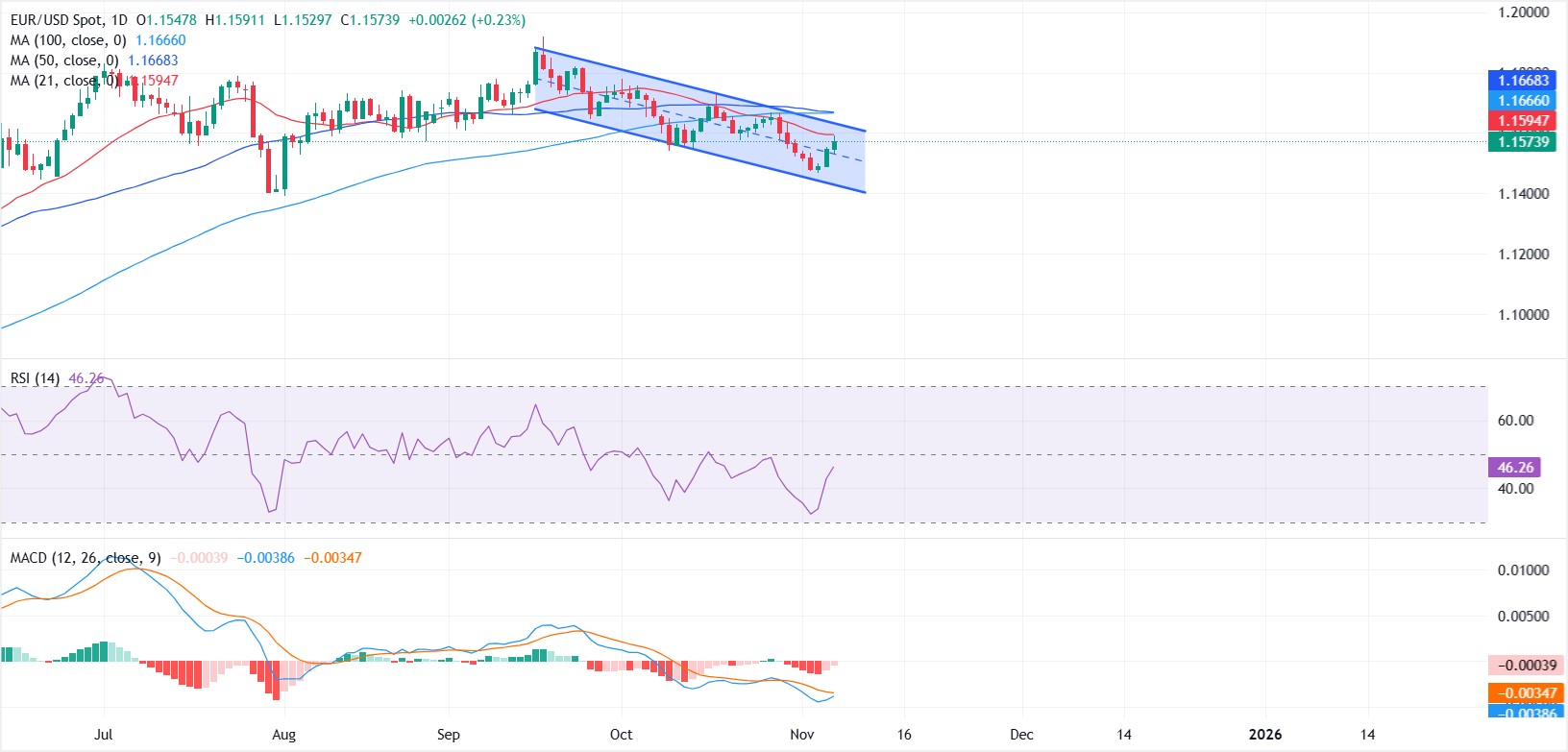EUR/USD Price Forecast: Euro regains strength, nears key resistance around 1.1600
- EUR/USD rises to a one-week high amid broad US Dollar weakness.
- Bull's eye breakout from descending channel as RSI and MACD turn constructive.
- A daily close above 1.1600 may confirm the start of a broader recovery phase.
The Euro (EUR) extends its rebound against the US Dollar (USD) on Friday, building on renewed weakness in the Greenback. At the time of writing, EUR/USD is trading near 1.1575, its highest level since October 30.
The pair is showing strong upside momentum after briefly sliding to a three-month low on Wednesday and is on track to post a weekly gain following two consecutive weeks of declines.

On the daily chart, the pair remains confined within a descending parallel channel that has guided price action since September 17, when EUR/USD peaked at 1.1918, its highest level since June 2021. The latest rebound brings the pair closer to the upper boundary of the channel, which aligns with the 21-day Simple Moving Average (SMA) near 1.1590.
A decisive break above this zone could attract fresh buying interest from the bulls and open the door toward the 1.1665–1.1670 region, where the 50-day and 100-day SMAs converge. Sustained strength beyond this area would signal a bullish breakout and mark the first meaningful shift in trend since mid-September.
On the downside, immediate support lies at the weekly low of 1.1468, near the lower boundary of the channel. A break below this region could reignite bearish pressure, exposing 1.1461, the July 31 low, as the next downside target.
Momentum indicators are turning constructive. The Relative Strength Index (RSI) has recovered from near-oversold territory and now hovers just below the 50 threshold, suggesting that bullish pressure is gradually building. Meanwhile, the Moving Average Convergence Divergence (MACD) indicator is showing early signs of a bullish crossover, as the signal lines narrow and the histogram fades from negative territory.
Overall, EUR/USD’s short-term outlook remains constructive as long as the pair holds above 1.1500. Bulls are regaining confidence, and a daily close above 1.1600 would confirm the start of a broader recovery phase following weeks of downward correction.
Euro FAQs
The Euro is the currency for the 20 European Union countries that belong to the Eurozone. It is the second most heavily traded currency in the world behind the US Dollar. In 2022, it accounted for 31% of all foreign exchange transactions, with an average daily turnover of over $2.2 trillion a day. EUR/USD is the most heavily traded currency pair in the world, accounting for an estimated 30% off all transactions, followed by EUR/JPY (4%), EUR/GBP (3%) and EUR/AUD (2%).
The European Central Bank (ECB) in Frankfurt, Germany, is the reserve bank for the Eurozone. The ECB sets interest rates and manages monetary policy. The ECB’s primary mandate is to maintain price stability, which means either controlling inflation or stimulating growth. Its primary tool is the raising or lowering of interest rates. Relatively high interest rates – or the expectation of higher rates – will usually benefit the Euro and vice versa. The ECB Governing Council makes monetary policy decisions at meetings held eight times a year. Decisions are made by heads of the Eurozone national banks and six permanent members, including the President of the ECB, Christine Lagarde.
Eurozone inflation data, measured by the Harmonized Index of Consumer Prices (HICP), is an important econometric for the Euro. If inflation rises more than expected, especially if above the ECB’s 2% target, it obliges the ECB to raise interest rates to bring it back under control. Relatively high interest rates compared to its counterparts will usually benefit the Euro, as it makes the region more attractive as a place for global investors to park their money.
Data releases gauge the health of the economy and can impact on the Euro. Indicators such as GDP, Manufacturing and Services PMIs, employment, and consumer sentiment surveys can all influence the direction of the single currency. A strong economy is good for the Euro. Not only does it attract more foreign investment but it may encourage the ECB to put up interest rates, which will directly strengthen the Euro. Otherwise, if economic data is weak, the Euro is likely to fall. Economic data for the four largest economies in the euro area (Germany, France, Italy and Spain) are especially significant, as they account for 75% of the Eurozone’s economy.
Another significant data release for the Euro is the Trade Balance. This indicator measures the difference between what a country earns from its exports and what it spends on imports over a given period. If a country produces highly sought after exports then its currency will gain in value purely from the extra demand created from foreign buyers seeking to purchase these goods. Therefore, a positive net Trade Balance strengthens a currency and vice versa for a negative balance.